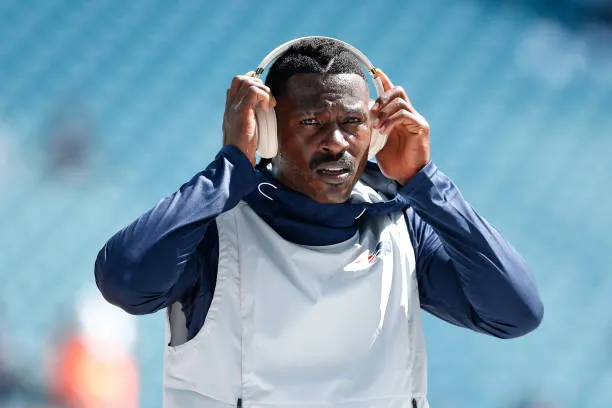FOXBOROUGH, MA – July 13, 2025 – In a move that solidifies the New England Patriots’ coaching staff and sends a clear message about the allure of their evolving program, Tight Ends Coach and Passing Game Coordinator Thomas Brown has reportedly turned down an astonishing $3 million annual offer from the AFC East rival New York Jets. This audacious bid from the Meadowlands was a bold attempt to lure one of the NFL’s most promising offensive minds, but Brown’s decision to remain in Foxborough underscores a strategic commitment to the Patriots’ vision and a belief in the direction of the franchise.
The news, initially circulating among league insiders and later confirmed by sources close to both organizations, has ignited fervent discussion across the NFL, particularly within the AFC East. The Jets’ aggressive pursuit of Brown was a clear indication of their desire to inject fresh offensive creativity and a proven developer of talent into their coaching ranks. The $3 million figure, an exceptionally high salary for a position coach and coordinator, highlights Brown’s rapidly rising stock after a season where he played a pivotal role in the Patriots’ offensive resurgence.
“It was an incredibly lucrative offer, one that very few position coaches in the league would ever see,” a source familiar with the negotiations revealed, speaking on condition of anonymity. “The Jets presented a very appealing package and a significant role. But Thomas has a strong belief in what Coach Vrabel is building in New England. He sees the potential here, and that clearly outweighed the financial incentive to move.”
Brown, who joined the Patriots’ staff under Head Coach Mike Vrabel, quickly established himself as a vital component of the offensive brain trust. His innovative approach to utilizing tight ends, combined with his expertise in designing effective passing concepts, played a crucial role in the development of young offensive talent and the overall improvement of the Patriots’ aerial attack. The synergy between Brown, Offensive Coordinator Alex Van Pelt, and Head Coach Vrabel has been particularly effective, creating a cohesive and adaptable offensive system.
The New York Jets’ desperation for offensive consistency and playmaking has been a well-documented narrative. After a challenging season marked by offensive struggles, the Jets were keen to make a splash hire that would energize their fanbase and provide a clear direction for their program’s attack. Brown, with his proven track record of player development and his reputation for innovative scheme design, was reportedly at the top of their wishlist. The reported $3 million offer was a testament to how highly the Jets valued his capabilities and how much they believed he could transform their offensive fortunes.
However, Brown’s decision to stay speaks volumes about the environment and ambition within the Patriots organization. While the financial aspect is always a consideration in professional sports, sources indicate that Brown’s comfort level with Coach Vrabel’s leadership, the collaborative nature of the coaching staff, the talent acquisition strategy, and the opportunity to contribute to a program with a clear path to contention were paramount. The stability and resources available in New England, coupled with a genuine belief in the team’s trajectory, likely outweighed the allure of a significant pay raise at a rival institution facing a more substantial offensive overhaul.
“Coach Brown is deeply invested in the growth of our players and the success of our offense,” said a prominent Patriots player, who requested anonymity to speak freely. “He brings a lot of energy and a lot of smarts. We’re all excited he’s staying because he’s a huge part of what we’re doing here.”
The news has been met with a collective sigh of relief from the Patriots fanbase, who had grown increasingly anxious about the possibility of losing a key offensive coach. Social media platforms were abuzz with celebratory messages, praising Brown’s loyalty and commitment to the “Patriot Way.” For Jets fans, the rejection is a bitter pill to swallow, highlighting the ongoing challenges they face in attracting top-tier coaching talent away from established programs.
This decision also has broader implications for the escalating salaries of assistant coaches in the NFL. The $3 million offer to a position coach and passing game coordinator sets a new benchmark for what teams are willing to pay to secure and retain top-tier talent, further blurring the lines between head coach and coordinator compensation. Brown’s refusal, despite the record-setting sum, suggests that factors beyond pure economics are increasingly influencing coaching decisions, especially for those already in highly desirable positions within stable and ambitious organizations.
For Thomas Brown, the focus now returns squarely to the upcoming season. With the offensive scheme continuing to evolve and a talented roster at his disposal, expectations for the Patriots’ offense will be high. His decision to remain in New England reinforces the perception of stability and strength within the program, sending a clear message to players, agents, and opponents alike: the Patriots are building something special, and their key architects are fully committed to its continued evolution and success. The AFC East, and indeed the entire NFL, will be watching closely to see the dividends of this pivotal decision.



